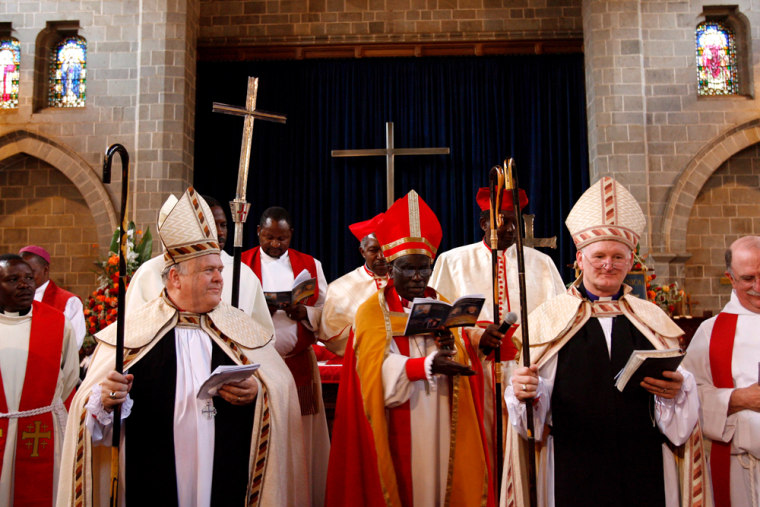Two American priests were consecrated Thursday as Anglican bishops in Kenya, the latest in a string of conservative priests who are defecting to African churches in a dispute over gay clergy.
Bill Atwood of Texas and William Murdoch of Massachusetts left the Episcopal Church, the U.S. branch of the worldwide Anglican Communion, because it allows the ordination of gay priests.
"The gospel ... must take precedence over culture," said Archbishop Drexel Gomez of the West Indies, one of 10 Anglican leaders or representatives who attended the ceremony in Nairobi's All Saints Cathedral. "Homosexual practice violates the order of life given by God in Holy Scripture."
Church split over gay issue
The spiritual head of the Anglican Communion, Archbishop of Canterbury Rowan Williams, has asked African archbishops not to consecrate U.S. priests to help avoid a schism. Kenyan Archbishop Benjamin Nzimbi said there had been no direct communication with Williams over the Thursday's ceremony.
Williams has no direct authority to force a compromise because each Anglican province is self-governing.
The Anglican Communion has moved toward the brink of splitting since the Episcopal Church consecrated its first openly gay bishop, V. Gene Robinson of New Hampshire, in 2003. Most of the fellowship's 77 million members are based in the developing world, where homosexuality is strongly discouraged and often illegal.
A split would be a financial hardship for the communion because the small but wealthy Episcopal Church, which has 2.4 million members, provides a significant chunk of the budget.
Both sides say the issue goes deeper than simple acceptance of gay clergy. Liberal Anglicans say the Bible's message of tolerance means there should be a place for everyone in church, but conservatives say that is bending the word of God to fit fashion.
Power struggle
After Thursday's ceremony, Atwood and Murdoch will return home to minister to their congregations with Nzimbi as their spiritual adviser. Because they are no longer affiliated with the Episcopal Church, the men will have to find new church buildings and funding in the United States. Several U.S. churches whose priests have switched to a foreign diocese are embroiled in lawsuits over church property.
Nzimbi said 30 U.S. congregations have asked to become part of African dioceses in the last four years. Six other U.S. priests have been consecrated as bishops in the Rwandan church and one has also been consecrated in Nigeria. Another American priest is scheduled to be consecrated in Uganda on Sunday.
After Nigerian Archbishop Peter Akinola set up the Convocation of Anglicans in North America in 2005, some U.S. liberals accused African archbishops of breaching protocol by trying to create rival churches on their territory. Akinola administers his convocation from Nigeria.
Davis Mac-Iyalla, who heads Nigeria-based Changing Attitudes, an organization of gay Anglicans, said arguments were being used to mask political struggles within the church.
"It is all politics and all about control," he said, adding that African archbishops "are being used by Western conservatives because they want to control the church."
Not all African Anglicans are opposed to homosexuality, Mac-Iyalla said.
"My Scripture has not condemned me," he insisted. "Jesus came and died for everybody."
Next month, Episcopal bishops will meet to decide whether they should agree to demands that they unequivocally pledge by Sept. 30 not to consecrate another openly gay bishop. If the bishops say no, the church could lose its full membership in the communion.
